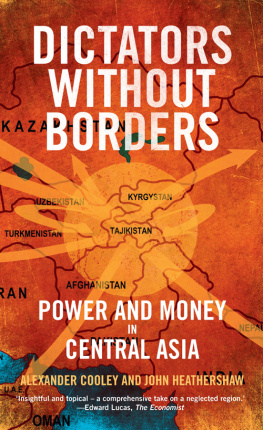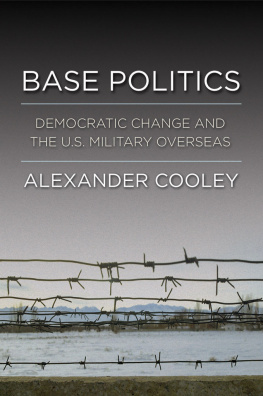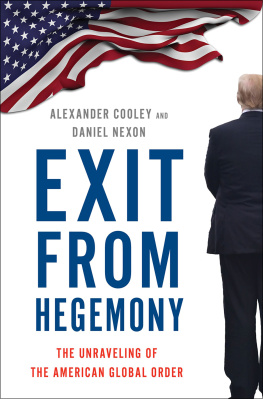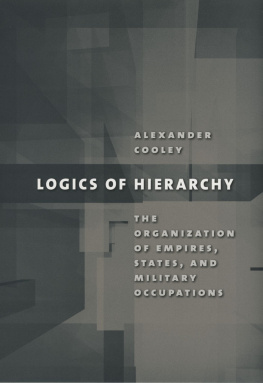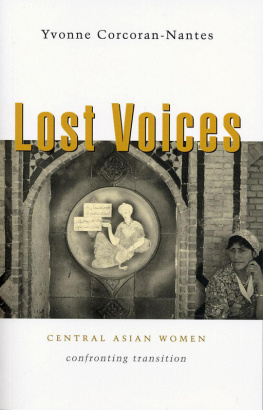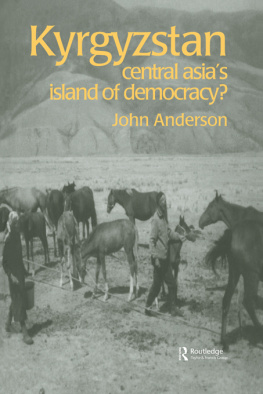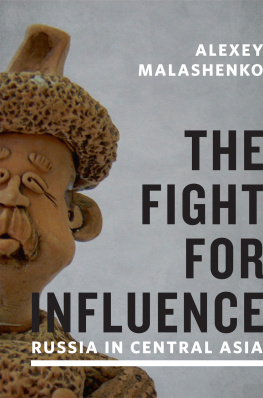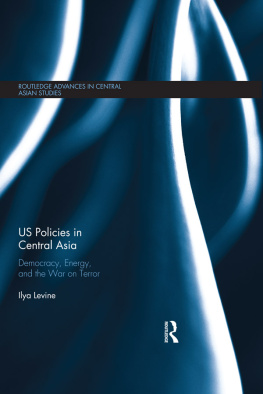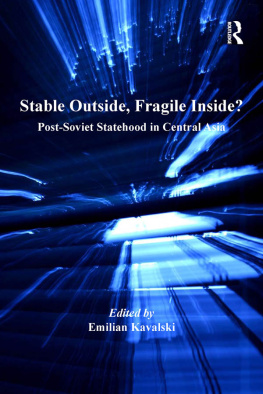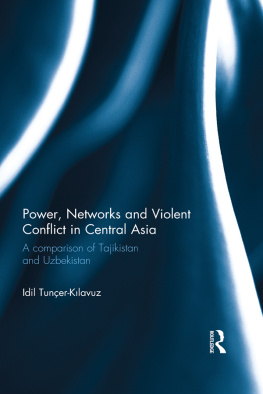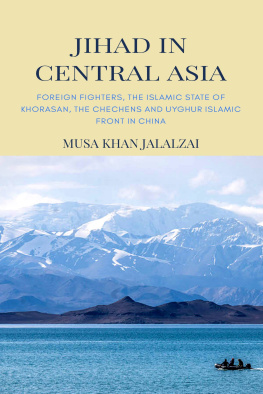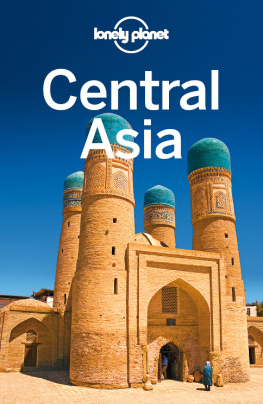DICTATORS WITHOUT BORDERS

Copyright 2017 Alexander Cooley and John Heathershaw
All rights reserved. This book may not be reproduced in whole or in part, in any form (beyond that copying permitted by Sections 107 and 108 of the U.S. Copyright Law and except by reviewers for the public press) without written permission from the publishers.
For information about this and other Yale University Press publications, please contact:
U.S. Office:
Europe Office:
Typeset in Adobe Caslon Pro by IDSUK (DataConnection) Ltd
Printed in Great Britain by Gomer Press, Llandysul, Ceredigion, Wales
Library of Congress Control Number: 2016962066
ISBN 978-0-300-20844-3
A catalogue record for this book is available from the British Library.
10 9 8 7 6 5 4 3 2 1
For Nicole and Greta
and
for Julia, Grace and Sam
CONTENTS
FIGURES AND TABLES
PREFACE
I n April 2016, the offshore world hit headlines across the globe when records from the Panamanian law firm and company provider Mossack Fonseca were leaked online. The Panama Papers by far the largest data leak in the history of the secretive world of tax havens, with 11.5 million documents released captured the public consciousness and caused oligarchs, politicians and celebrities the world over to lose sleep. A whole series of revelations ensued about tax avoidance and suspected money laundering in high-value real estate. The front page of the Guardian told of the London skyscraper that is a stark symbol of the housing crisis with apartments owned by a Russian billionaire whose business partner is a close ally of Vladimir Putins, a Nigerian banker and ex-minister, and a former MP and vodka tycoon from the Central Asian republic of Kyrgyzstan. These three examples were among many which demonstrate that both West and East, North and South, are connected via offshore jurisdictions.
In the public consciousness, it was the effect the offshore world might have on the sacrosanct right of modern Westerners to own a home which really touched a nerve. But researchers at Global Witness, supported by students from the University of Exeter, had already linked central London properties to the offshore accounts of Central Asian oligarchs such as the former son-in-law of President Nazarbayev of Campaigners at Londons Transparency International and the New York headquarters of the Open Society Foundation saw new opportunities to force tax havens to publish registers of beneficial owners. One academic colleague had the unusual experience of flying business class to preparatory meetings for David Camerons May 2016 anti-corruption summit at the expense of the very offshore jurisdictions that he had studied for many years. For us and these colleagues of ours, the questionable claim about the inflation of Western real estate markets was merely the tip of the iceberg.
As this book details, autocrats and their cronies use Western financial, legal, policing and political systems to both extend their power back home and to selectively access Western institutions, status symbols and legal protections. Tajikistans largest state-owned enterprise opaquely diverts the proceeds from its aluminium industry into accounts in the British Virgin Islands (BVI). The elite of Turkmenistan hold personal dollar-dominated accounts managed by Deutsche Bank. Relatives of Uzbekistans strongman president accepted bribes from several international telecoms providers via offshore accounts in Gibraltar and stored the proceeds in several different foreign bank accounts. The Kazakh government routinely uses the international policing organisation Interpol in their politically motivated pursuit of former high-ranking officials and their associates who have become exiled opponents of the regime, while members of the Kazakh elite themselves purchase luxury real estate holdings around the world via shell companies. The Tajik regime has used its BVI account to apparently dodge reporting requirements to the Justice Department regarding its lobbying of US Congress.
And Central Asia is not exceptional. Much of the world is governed for the benefit of a small number of people who hide their profits in offshore accounts. In short, the whole system of international law, universal human rights and global governance has been undermined by secretive offshore jurisdictions, leaving researchers, journalists and advocates to assess the extent of the damage.
These stories are some of many detailed in this book about those Central Asian republics that gained independence in 1991, and Central Asia is not predestined to corruption by its past, its culture, its religion or its traditional social ties. Rather, Central Asias dictators and their allies are able to abuse power and pilfer their countries resources because of the fact that international bankers accept their business and foreign politicians dont properly enforce their own laws. We explore the contours of this modern marriage of self-serving power politics to the increasingly sophisticated global financial and legal architectures and the professional intermediaries who manage them.
We use dictators and autocrats interchangeably in this book. Dictatorship refers to trenchant systems of authoritarian rule and neo-patrimonial relations. Authoritarian rule refers to systems in which political authority is concentrated in the hands of the few and exercised without effective accountability to parliament, the judiciary, civil society or a free press. Neo-patrimonial relations refer to the means by which leaders (patrons) lock in junior allies (clients) in modern states via networks which typically provide financial rewards but demand absolute political loyalty. There is a huge amount of academic literature on these two concepts within our field which we will not explore here. Occasionally, when referring to the economic dimensions of dictatorships we refer to them as kleptocracies (a term used to highlight dictators abuse of office to enhance personal power and wealth) and their behaviour in the global market as crony capitalism (a term used not to imply an aberration but a common form of capitalism across many regions including Central Asia).
The without borders of this books title is a play on the sans frontires phrase in the names of Mdecins Sans Frontires (MSF), Dentistes... (DSF), Educateurs... (ESF), Reporters... (RSF), etc. Modern autocrats have effectively taken on this mantra to subvert the idealised version of globalisation as transnational humanitarian action. But to say they are dictateurs sans frontires is not to say they have complete freedom of movement without the encumbrance of national borders and sovereignty. In fact, their actions beyond borders are often in the use of their sovereign status and power to get things done overseas. There are three senses in which dictators are without borders.
First, and in the traditional liberal understanding, dictators are without borders in that they operate without moral and legal limits on their use of power. This is not to say they do not operate within their own laws they sometimes do, they sometimes dont. They remake their laws to allow themselves to run for office as many times as they wish, extort the independent private sector (to the extent that it often ceases to exist) and pilfer from the public purse. At times they simply break national and international law by torturing their opponents or pervert the law to declare their non-violent enemies to be terrorists or criminals in order to eradicate them. Such actions actually often take place at the scale of domestic or national authoritarian government. There are plenty of examples of this old-fashioned style of dictatorship in this book.
Next page
